Tag Archive for: lung cancer specialist
Expert Advice for Patients With Small Cell Lung Cancer
Expert Advice for Patients With Small Cell Lung Cancer from Patient Empowerment Network on Vimeo.
Dr. Triparna Sen, a leading small cell lung cancer (SCLC) researcher and expert, shares key advice for patients. Dr. Sen stresses the importance of working closely with your doctor, asking about clinical trials options, and the benefits of support groups.
Dr. Triparna Sen is an associate professor in the department of oncological sciences and co-director of the Lung Cancer PDX Platform at the Icahn School of Medicine at Mount Sinai in New York. Learn more about Dr. Sen.
See More from Thrive Small Cell Lung Cancer
Related Resources:

|
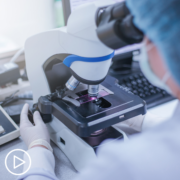
Advances in Small Cell Lung Cancer Research | Hope for the Future |
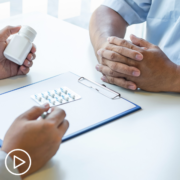
|
Transcript:
Katherine:
What three key pieces of advice would you have for a patient who has just been diagnosed with small cell lung cancer?
Dr. Sen:
First of all, I would like to say definitely, definitely work with your physician. They are trying to do their best for you. Work with your physician. Follow the treatment regimen that they give. Ask about clinical trials that you are eligible for and that you can enroll into. Then, of course, having a support group. So, there are many patient advocacy groups right now for non-small cell and small cell lung cancer.
I think being a part of such a patient advocacy group where you have people going through the same journey, I think, it really helps. It helps you sort of manage your disease better. It helps you stay hopeful when you hear about other people’s sort of prognosis and if they have durable benefits from drugs. So, I think having a support group is very important. If there is an ability for you to contribute to research in terms of giving blood or tissues, if your physician is saying that you could be eligible for that, I think a contribution to research is really key.
Because looking at the disease mechanisms in the clinical tissue is sort of where for us it is absolutely golden. We go there. We look at the disease mechanisms and tissues. If there is an opportunity for you, then I think it should definitely be explored.
Finally, I would like to say we are really trying as researchers to really understand the disease better. We’re trying to do that better. I hope and I pray that we go faster with it. But I think there is hope right now for patients with small cell lung cancer. The research is really progressing better. There are many clinical trials.
So, I think stay hopeful and have a peer support group who can take you through this quite difficult journey.
Katherine:
Why should patients consider consulting with a lung cancer specialist?
Dr. Sen:
I think it’s crucial because these lung cancer specialists really know the current state of the art treatments. They are thought leaders. They participate in trials. They actually sit on advisory boards with companies.
They are strategizing the entire treatment landscape for this disease. So, if you go to a lung cancer specialist, you’re more likely to get the most updated knowledge about what treatments are out there, what you qualify for, what are the clinical trials out there, and what are working in patients. This is not just for small cell. There are many, many trials that are happening in non-small cell also. So, whatever your diagnosis is, a specialist should be able to tell you what your options are. You really want to know about your options. Your options about biomarker testing.
Your options about screening. Your options about trials. I think a lung cancer specialist can really guide you towards that.
Katherine:
Dr. Sen, thank you so much for joining us today. It’s been a pleasure speaking with you.
Dr. Sen:
Thank you.
Lung Cancer Care Decisions | Advice for Self-Advocacy
Lung Cancer Care Decisions | Advice for Self-Advocacy from Patient Empowerment Network on Vimeo.
Program Description: Should you see a lung cancer specialist? Dr. Erin Schenk shares advice for being proactive in your lung cancer care, the importance of speaking up and asking questions, and the benefit of seeking a second opinion with a specialist.
Dr. Erin Schenk is a medical oncologist, lung cancer researcher, and assistant professor in the division of medical oncology at the University of Colorado Anschutz Medical Center. Learn more about Dr. Schenk.
See More From INSIST! Lung Cancer
Related Resources:

Non-Small Cell Lung Cancer Essential Testing | What You Should Know |
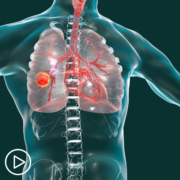
|
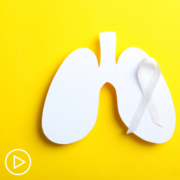
Personalized Lung Cancer Treatment | Key Factors to Consider |
Transcript:
Katherine Banwell:
Because this program is part of our Insist series which empowers patients to insist on better care. Can you tell us why you think it’s important for patients to speak up and engage in their lung cancer care decisions?
Dr. Erin Schenk:
Absolutely, and I think as a physician it’s important not only to partner with patients but as well as their loved ones and their caregivers who help navigate this diagnosis of lung cancer. There are some diagnoses in the world, cancer being one of them and lung cancer especially that can turn everything upside down. So, it completely changes your world. Suddenly the life as you’ve been living it, the plans you had they all have to be paused or halted in some way to get care for the lung cancer diagnosis.
One of the – and one of the really hopeful parts about being a doctor who cares for patients with lung cancer is just the speed of the advancements and the speed of the changes in the treatment options that we have for patients diagnosed with really any type of lung cancer.
And so, I think it’s really important when you’re meeting with your team and you’re talking with your cancer doctor to really try to understand what is the information that they use to make some of these decisions or referrals on your behalf? And also, think about, is there an opportunity for me to get another opinion about what might be the best options?
Katherine Banwell:
When should patients consider a second opinion or even consulting a specialist?
Dr. Erin Schenk:
I think any time it’s appropriate. We – at our institution, we’re one of the main lung cancer centers that – you know, within several hundred miles, so we frequently see patients and sometimes it’s just to check in and say you know, the patient says, “Here’s what my team has started me on. You know, what do you think should be the next approach?” and we talk about that, but really anytime I think is appropriate for reaching out for another set of eyes to look at things. I would say perhaps some of those most critical times would be prior to treatment starts especially if – yeah, I would say prior to starting a treatment with that new diagnosis.
That would be a really critical time because often again, sometimes once we start down a treatment path, we’re in some ways we’re committed, but if that maybe isn’t the optimal treatment path based on, you know, the tumor and the biomarkers and the patient preference starting on that less optimal treatment path could potentially hurt patients in the long run. So, I would say at – you know, potentially at diagnosis when a treatment course is recommended and then if there is a need to change treatments.
So, for example, especially in the metastatic setting there are certain therapies widely available. People are very familiar with them, can start them no problem, but when those treatments stop being beneficial that might be a time to also meet with a specialist or go to a lung cancer center of excellence to get their opinions on what to do next.
Empowering Lung Cancer Patients to Increase Their Treatment Options
Empowering Lung Cancer Patients to Increase Their Treatment Options from Patient Empowerment Network on Vimeo.
How can lung cancer patients be empowered to increase their treatment options? Experts Dr. Nicole Rochester and Dr. Olugbenga Okusanya explain ways to improve access to lung cancer treatments and to process information more completely for the best care.
See More from Best Lung Cancer Care No Matter Where You Live
Related Resource:
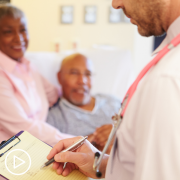
|

|
Transcript:
Dr. Nicole Rochester:
If we shift gears a little bit and talk about access and some of the concerns about treatment access for lung cancer patients, we know that sometimes these barriers that patients face actually limit their access to treatments, and you indicated surgery as being the mainstay and some difficulties with that, so how can we empower patients so that they don’t feel limited in their care, and how do we make them aware of these treatment options that are available, so that if they are in an office and maybe something’s being offered, but that’s not actually, the standard of care, how do we empower them to get that information and then to act on it?
Dr. Olugbenga Okusanya:
Yeah, so number one, which is something I think people do and they don’t realize how valuable it is, bring a friend to the appointment, don’t come by yourself, because you are in an incredibly vulnerable position, you’ve learned or are learning something incredibly emotionally charged and usually very scary. So, you want to bring someone who obviously is going to love you and care about you, but has enough emotional distance from it that they can be your advocate, they can ask those questions in the room that you may just not be there mentally to ask. Number two, never be afraid to get a second opinion, if you’re lucky enough to live in a populous area with multiple health systems, get a copy of your chart, get a copy of your data, get your disc, make an appointment to see another specialist in another health system and see what they say. Because at the very least, if the information is concordant, then you’re going to feel pretty good about saying, “Okay, then I should just go where I think I feel best or who I have the best sort of relationship with?” And again, if you are not lucky enough to have that opportunity, I would be very aggressive about seeing if telehealth is an option to reach out to someone who is a specialist, I’ve had not happened to me in the past, I remember I had a woman who telehealth, me from Ohio, because she’d actually read one of my papers about lung cancer, and she sent her scans, uploaded them, I looked at them and I gave her my opinion, and this is the new age or medicine.
This is where we’re at now. This is a viable option, and even if telehealth isn’t an option, you can always just get on the phone. As a lung cancer specialist, a lot of the information I need can be garnered from test scans and images, so frankly, the physical exam has some role, but is not the mainstay of how a lot of the decisions are made. So even if I see your scans and I talk to you, I can give you an opinion over the phone, it takes me 15 to 20 minutes, and a lot of times, those visits may not even be charged, depending on who you actually ask to give you an opinion.
Dr. Nicole Rochester:
I’m a huge proponent of second opinions, I’ve talked to so many patients and family caregivers who think that they’re offending their doctor if they ask for a second opinion, so I appreciate that you brought that to the forefront and you deserve to have multiple opinions as you’re making these very important life-changing decisions.
How Can BIPOC Lung Cancer Patients Guard Against Health Inequities?
How Can BIPOC Lung Cancer Patients Guard Against Health Inequities? from Patient Empowerment Network on Vimeo.
How can BIPOC lung cancer patients guard against health inequities? Experts Dr. Nicole Rochester and Dr. Olugbenga Okusanya share advice for questions to ask your doctor and ways to ensure optimal lung cancer care.
See More from Best Lung Cancer Care No Matter Where You Live
Related Resource:
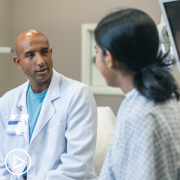
|
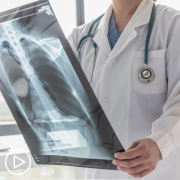
|
Transcript:
Dr. Nicole Rochester:
What are some things that patients of color can do in order to protect themselves from these inequities that you’ve talked about, starting with diagnosis and treatment, what can we do? What can patients of color do?
Dr. Olugbenga Okusanya:
So, I think the number one thing is to ask questions, the number one thing is to say, what are my options? What am I dealing with? What should I do or what shouldn’t I do? And to really make sure you get the most at that time when you see a physician, because that is really what we’re there for apart from the surgery, I’m really there to be an educator. I teach as much as I operate on a daily basis whether it be the medical training is whether in my patients, my job is to communicate information back and forth, so you really want to spend the time asking questions and getting as much information out, as much as you can. Number two is, see a specialist. There’s also very good data to indicate that as a Black patient, if you see a board-certified thoracic surgeon, you are more likely to get lung cancer surgery than if you were to see a surgeon of unknown specialization, a general surgeon. So clearly the training gives specialist the ability to make finer determinations and discernments that I think in large part favor Black and minority patients, so you want to find someone who deals with these disease processes all the time because they’re going to look at it in a much higher level and look at it with a lot more granularity.
Dr. Nicole Rochester:
Just have to repeat what you said, you said, I teach as much as I operate. That just really resonated with me, and I think that…that’s so incredibly important. Doctor means teacher, right? I think that’s the Latin…we are obligated to teach our patients, so I just really appreciate that that’s something that you incorporate in your daily practice.
New and Improved Lung Cancer Treatment Options
New and Improved Lung Cancer Treatment Options from Patient Empowerment Network on Vimeo.
Are there new lung cancer treatment options that you should know about? Expert Dr. Heather Wakelee reviews the latest research. Looking for more information? Download the Find Your Voice Resource Guide here.
Heather Wakelee, MD is Professor of Medicine in the Division of Oncology at Stanford University. More about this expert here.
See More From the The Pro-Active Lung Cancer Patient Toolkit
Related Programs:

Lung Cancer Treatment Decisions: Which Path is Best for You? |

|

|
Transcript:
Dr. Wakelee:
So, the treatment of lung cancer has been changing very, very quickly. We’ve had a lot of new options that have become available in the last few years, and there’re new ones coming along all the time. When I started treating lung cancer, which was a number of years ago, we were able to treat and help people.
But our only real option when the cancer was metastatic was chemotherapy. Chemotherapy is still an important part of treatment for many people, but now we have other options. So, starting about 15 years ago, people were able to identify that some tumors had specific genetic changes. We also call these molecular changes, or gene mutations, or just mutations in the tumor. They have a lot of different names.
But when we do find them, these are things like EGFR or ALK or ROS or BRAF or MET, we actually have different treatment options that only work for tumors that have those specific genetic changes, and don’t work in tumors that don’t have those. So, when we talk about genetic changes a lot of people think, “Oh, that’s something that I’ve inherited.”
These are not things that are inherited. This is not something that’s in the whole person. It’s just in the tumor. So, it’s a mutation that happened in the DNA of the cell, and that cell then became the cancer. And depending on what that mutation or mutations are, we still can have chemotherapy, and that can work.
But for specific ones, and specifically EGFR, ALK, ROS, BRAF, we know that there are pill drugs and oral medication that actually is gonna be better than chemo, at least for a period of time, if a cancer has that specific mutation.
So, it’s really, really important to figure that out. It’s not something a doctor can sort out just by looking at the patient or looking at the tumor under the microscope. We have to do special testing, looking at the tumor DNA.
And we now have ways of looking for those mutations, not just in the tumor tissue, but also sometimes with blood. So, we can draw a blood test and look for those as well when there’s a tumor that’s shedding the DNA. So, it’s really important to think about that. And we now have a whole host of medications that we can offer people when we the find these mutations that we didn’t used to have, even a few years ago.
And, actually, if you think back over the last five years, we’ve had new drugs approved, a few of them every year, for these specific gene mutation tumors, so that’s really, really exciting. The other thing that’s changed dramatically just in the last five years is what we call immune therapy.
So, when we think about the different types of treatment, chemotherapy works by poisoning DNA. And in order to make a new cell, you have to make new DNA. Tumors are doing that more than a lot of normal tissue, and so we’re able to give chemotherapy and specifically hurt tumors and not the rest of the person very much.
With the targeted treatments where we find a gene target and where there’s a gene mutation in a tumor, those are medications that specifically hit that altered gene, that altered protein made by the gene. And then they work really, really well. What immune therapy does is it actually changes the way your body’s own immune system interacts with the tumor. So, we have a lot of types of immune cells, but the ones that are involved in really fighting the cancer directly are called T cells.
And so, normally, a T cell would recognize something that’s foreign like an abnormal-looking cell that’s a cancer, and attack it. But we have a lot of different systems in our body that stop the T cells from recognizing normal tissue and attacking it.
And one of the best systems for that is something called PD-1 and PD-L1. And so, if you have a T cell and it sees a PD-L1 signal on tissue, it assumes that that tissue was normal tissue and it doesn’t attack. But if you can hide that PD-L1 signal, then if it’s a T cell, a part of the immune system comes in and doesn’t see the PD-L1, it doesn’t get the stop signal. It’s not told to not attack. So, it could attack the tumor better.
And I’m not describing it well because it’s so complicated. There are a lot of different factors that help a T cell know whether to attack or not to attack. But, again, one of these key stop signals is the PD-1, PD-L1 interaction. And so, scientists were able to develop medications that can block PD-1 or PD-L1. And when those medications are in the body, if a tumor is using that particular stop signal as a way to hide from the immune system, when you give the medication that blocks it then the tumor is no longer hiding.
And then the immune system, those T cells, can come in and attack. So, these immune treatments, and there are now a lot, and so these are drugs, like pembrolizumab, also called Keytruda; nivolumab, which also called Opdivo; durvalumab, which is called IMFINZI. And there are many, many others. Those medications have now been shown to really, really help to fight cancer, particularly when the tumor is using that PD-L1 signal. But they can also be combined with chemotherapy and then they work even if there’s not a lot of PD-L1 in the tumor. So, again, it’s a very complex story.
But where we’ve seen dramatic improvements in treatment is we have targeted treatments when the genes are – there are specific genes mutating in tumors. We have immune therapy, which worked for a lot of other people. And sometimes when there’s also gene mutation, but not always, we still have chemotherapy. And then there’s ongoing research with a lot of different medications. Many of them are focusing on better ways to get the immune system to work against cancers beyond what we can already do.
Diagnosed with Lung Cancer? Why You Should Seek a Second Opinion
Diagnosed with Lung Cancer? Why You Should Seek a Second Opinion from Patient Empowerment Network on Vimeo.
Should you seek a second opinion? Lung cancer expert Dr. Heather Wakelee explains when to consider seeing a specialist. Looking for more information? Download the Find Your Voice Resource Guide here.
Heather Wakelee, MD is Professor of Medicine in the Division of Oncology at Stanford University. More about this expert here.
See More From the The Pro-Active Lung Cancer Patient Toolkit
Related Programs:

|

|
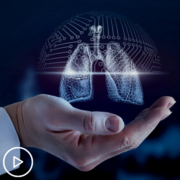
|
Transcript:
Dr. Wakelee:
So, when facing a new diagnosis of lung cancer, one of the questions that often comes up is whether one should go get a second opinion or see a lung cancer specialist. And that is a question that obviously is gonna vary quite a bit by where a person is, where they’re getting seen, and what they’re facing.
I think a time that it’s really critical would be if someone has a Stage III lung cancer or told it might be Stage III. That’s a really good time to get a second opinion and make sure that the group that is taking care of you has had a multidisciplinary discussion. And when I say multidisciplinary, I mean, a thoracic surgeon, a radiation oncologist, and a medical oncologist have altogether looked at what’s going on with the particular case of that patient to decide up front what’s gonna be the best approach.
Because sometimes surgery is the right first approach. And sometimes it’s not. And sometimes radiation’s important, and sometimes it’s not.
So, it’s really critical to have a big team looking at what’s going on for Stage III. And if you’re in a hospital that really doesn’t see a lot of Stages III lung cancer that might be a good time to think about getting a second opinion outside of where you’re being treated.
I think, otherwise, if someone is newly diagnosed and we know the cancer is early stage where surgery might be involved, it’s good to check in that the surgeons who would be doing your operation are surgeons who know about lung cancer and have done lung cancer surgeries frequently. Sometimes in smaller hospitals there are surgeons who do both heart and lung surgery. And we know that the outcomes are not always quite as good in that setting.
Sometimes there’s no choice, and that’s okay. But if there is an opportunity to talk to a dedicated thoracic surgeon who’s used to doing lung cancer surgery, that’s another good time to get a second opinion. When we’re dealing with a more advanced stage of metastatic lung cancer, if someone is newly diagnosed and their tumor ends up having an unusual gene mutation or translocation.
And the molecular changes in lung cancer are really important to know about. And things like EGFR and ALK and RAS, where most medical oncologists will be familiar. But there’re others, like BRAF and RET and MET, and those can really change treatment outcomes as well, but not everybody who sees lots of different kinds of cancer as an oncologist will know everything there is to know about those.
So, if you have an unusual gene mutation, that’s another good time to get a second opinion with someone who’s a dedicated lung cancer expert. And usually those folks are at the larger academic medical centers, so oftentimes in cities, or affiliated with universities.
Another time is if someone does have a tumor with an EGFR, ALK, or one of the more common mutations, but the main drugs have stopped working, that’s often a time where someone who has specialized just in lung cancer might have some other options.
It’s also something to think through when someone’s newly diagnosed, if they know that their doctor has looked at the immune markers like PD-L1, and looked at the genetic changes in the tumor, and has a clear plan that’s gonna involve chemotherapy, or chemotherapy plus radiation, or chemotherapy plus immune therapy.
Then there might not be something that’s gonna be different in an academic center. But before you start treatment, if you’re still feeling okay, don’t have to start treatment tomorrow, and wanna know maybe that there’re clinical trial options, that’s another time to think about getting a second opinion. And a lot of academic centers will work to get people in very, very quickly if they knew they’ve just been diagnosed and they really need to get started on treatment right away.




